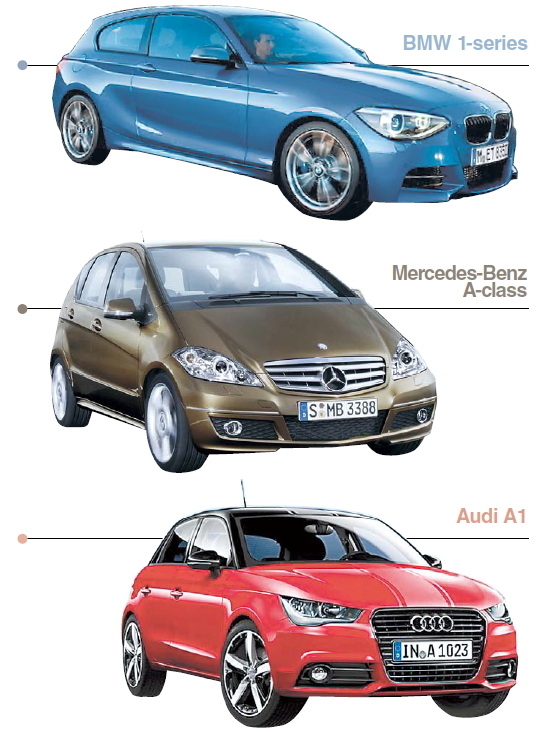Germany’s three premium automobile brands are targeting the middle-income bracket and young consumers in Korea, following the outstanding growth in their sales of upper segment sedans.
While the small segment import car market has been dominated by cars like the Volkswagen Golf, the MINI series and the Nissan Cube, the three brands ― BMW, Mercedes-Benz and Audi ― are poised to join the cheaper car sales competition.
BMW Group Korea started the war among the big three by recently introducing the second-generation 1-series, a premium compact.
Mercedes-Benz Korea plans to release the A-class next year and Audi Korea has been in consultation with its headquarters on whether to introduce the A1 hatchback in the local market.

As the BMW 1-series’ price tags range between 33.9 million won ($30,818) to 46.8 million won, depending on specs, the compact model is expected to appeal to young motorists as entry cars.
Ultimately, BMW Group is preparing to further expand its presence in the small segment as its MINI brand, a subsidiary, has already gained great popularity in Korea.
The German player saw its sales of the first-generation BMW 1-series, which was launched back in 2004, come to more than 1.5 million units globally though the initial model was not unveiled in the local market.
According to company spokespeople, the second-generation model features improved power, fuel efficiency and an unrivaled amount of interior space.
Mercedes-Benz Korea is fine-tuning consumer prices while the A-class model currently sells for around 24,000 euro ($30,800) in the European market.
An executive from Mercedes’ Stuttgart-based headquarters has predicted that the ratio of small segment car sales will increase up to about 33 percent from the current 25 percent level.
Audi Korea had downplayed the possibility of introducing the A1 model. But amid the recent movement of the two competitors, it is closely assessing future market conditions in coordination with its headquarters and parent Volkswagen Group.
Over the past few years, Volkswagen Group’s Audi brand has aimed for high-income earners while the Volkswagen brand has been successful in attracting a large portion of the middle-income bracket in the local market.
Smaller vehicles account for almost half of all import cars sold, according to the Korean Automobile Importers and Distributors Association.
In terms of prices, sales of imported cars between 30 million won and 40 million won took up about 30 percent of the local market, a nearly 10 percentage-point increase over the past five years.
Meanwhile, a series of import cars with relatively low price tags are aggravating the worries of Korea’s automakers, who are suffering a continuing drop in month-on-month vehicle sales at home.
“Cheap import cars have emerged as a threat not only to Hyundai Motor and Kia Motors but companies which operate manufacturing factories in Korea ― GM, Renault Samsung and Ssangyong,” said an executive in the local automotive industry.
By Kim Yon-se (
kys@heraldcorp.com)








![[Today’s K-pop] Blackpink’s Jennie, Lisa invited to Coachella as solo acts](http://res.heraldm.com/phpwas/restmb_idxmake.php?idx=644&simg=/content/image/2024/11/21/20241121050099_0.jpg)